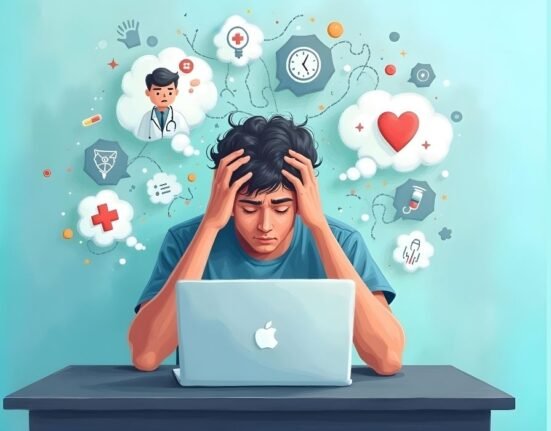A staggering number of 139123 Indians lost their lives to suicide in the year 2019. If that is not an indicator of mental health crisis, I wonder what could be! The global pandemic has only aggravated this problem. According to the World Health Organization (WHO), Covid-19 has led to bereavement, isolation, loss of income and fear which in turn are triggering mental health conditions. It is challenging or worsening existing ones. Despite all this, mental health remains one of the most overlooked areas of public health in India. It is the time that we start giving mental health it’s due importance and examine the ways we can make mental health available, accessible, and acceptable for all.
If we look at the term ‘Health’ itself, it is defined as “a state of complete physical, mental and social well-being and not merely the absence of disease and infirmity.” This signifies that the concept of health itself cannot stand without the component of mental well-being. In fact, the holistic approach to health consists of five dimensions – physical, emotional, mental, social and spiritual, and is based on the understanding that all these factors impact the overall health of an individual.
Also Read: Negative impact on the mental health of having siblings: study
Mental Health as a Matter of Public Importance
Mental health specifically has been defined by the WHO as “a state of well-being in which an individual realizes his or her own abilities, can cope with the normal stresses of life, can work productively and is able to make a contribution to his or her community.” It is therefore essential to the normal everyday existence of an individual. Moreover, studies have also shown a positive link between mental health and productivity, i. e., societies or organizations that give importance to mental well-being have been found to be more effective and productive. Consequently, society should consider mental health a matter of public importance. Apart from this, good mental health also enhances well-being, creativity and quality of life of individuals.
Today, over 14 percent of the total population in India suffer from some form of mental illness. Despite this, public perception about mental health and illness is full of stigma and judgement, with people often attributing the cause of mental illness to a lack of willpower and self-control. This discriminatory attitude along with issues of affordability and awareness contribute to the problem and are barriers to the availability and acceptability of mental health services.
Also Read: Mental health issues rising in Yemen: WHO
Challenges to availability and accessibility of mental health services:

- Lack of awareness: If a person gets the flu or hurts themselves, it is immediately apparent; but mental health issues often go unrecognized. People may be facing symptoms for a long while, but oftentimes they are not able to attribute it to the right causes. Mental illness symptoms are frequently dismissed as character traits or personality issues like laziness or moodiness. This lack of awareness prevents people from getting the help they need because if people don’t even realize they have a problem, how would they solve it?
- Social stigma: The stigma associated with mental illnesses prevents people from getting help. If people get physically sick, they can easily go to the doctor and seek treatment without any problem, but with mental health issues, there is a very real risk of facing discrimination in both social settings and professional circles. Many times, an individual’s personal views about mental illness can also prevent them from admitting their illness and seeking treatment for it.
- Shortage of mental health professionals: Even when people are able to recognize their mental health issues and are willing to seek the help they need, there is still the matter of shortage of mental health professionals. A very recent study conducted in 130 countries found that while the demand for mental services is constantly increasing, Covid-19 has disrupted critical mental health services in 93% of countries worldwide. Rural areas especially lack the necessary infrastructure and have few to no mental health service providers.
- Cost of access: Poverty is another factor that prevent people from getting the needed help. The cost of access to mental health services is a great barrier that stops people from seeking treatment. Often, mental healthcare access is unaffordable to those who need it the most.
These challenges to mental health services cause enormous issue. A National Mental Health Survey done in 2015-16 in India found that almost 80% of people suffering from some kind of mental illness did not receive treatment for over a year. The NMHS also found that economic burden caused mental illnesses often caused financial hardships for families, especially those from vulnerable groups.
Also Read: How Debt affects mental health?
Suggested solutions to enhance availability and accessibility of mental health services:
It is very important therefore to address these issues and one of the ways to do it is through education and awareness campaigns. The discriminatory attitude faced by people suffering from mental disorders can often be more devastating than the illness itself. Therefore, targeted intervention programs and campaigns designed for community awareness can go a long way in lessening the social stigma associated with mental illness. Another way to address these issues is through government intervention and funding because a lot of challenges associated with the access of mental healthcare is due to the costs of the services putting a huge economic burden on vulnerable people. Well-designed policies and their proper implementation with the help of government agencies. Educational institutions and NGO’s may also add value in availability and accessibility of mental health services.
Though, the problem of mental health services availability and accessibility for people in India is huge, but a composite effort of people, processionals, educational institutions and governmental agencies can play a key role in making things easier. I may help to making mental health services available, affordable and accessible to the people of India.













Leave feedback about this